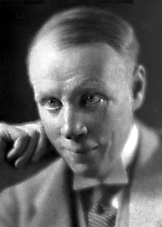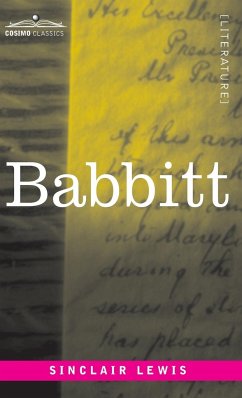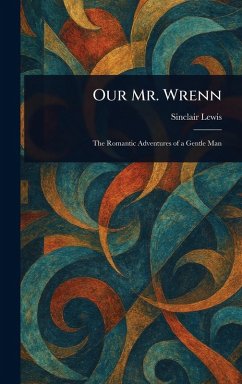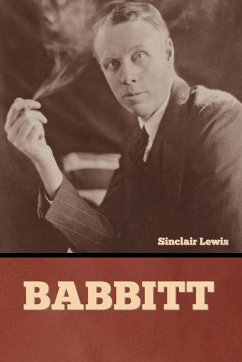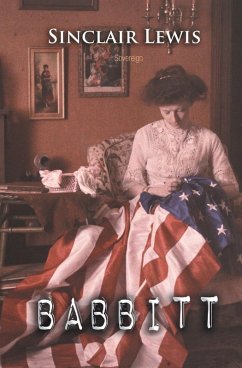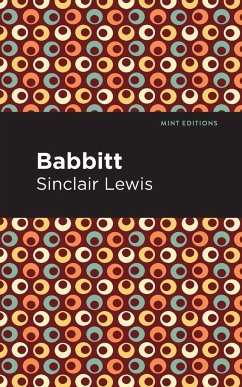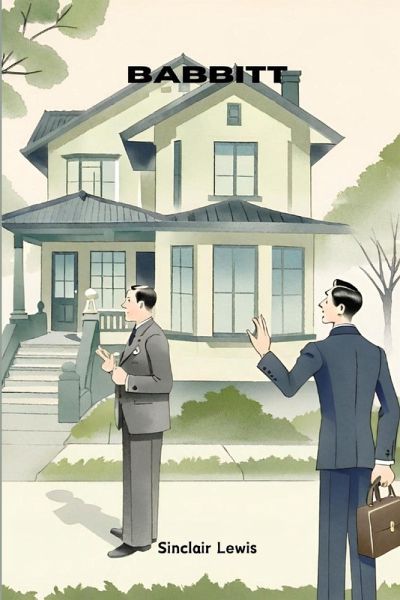
Babbitt (Annotated)
Versandkostenfrei!
Versandfertig in 1-2 Wochen
17,99 €
inkl. MwSt.

PAYBACK Punkte
9 °P sammeln!
"Babbitt," penned by the incomparable Sinclair Lewis, stands as a luminous jewel in the crown of American literature, a masterful exploration of the human condition within the bustling backdrop of 1920s Midwest America. Lewis's narrative prowess shines brilliantly in this poignant and satirical examination of George F. Babbitt, a quintessential everyman whose life becomes a canvas upon which the complexities of societal expectations, conformity, and the quest for self-discovery are masterfully painted. The novel unfurls in the bustling metropolis of Zenith, a Midwestern city emblematic of the ...
"Babbitt," penned by the incomparable Sinclair Lewis, stands as a luminous jewel in the crown of American literature, a masterful exploration of the human condition within the bustling backdrop of 1920s Midwest America. Lewis's narrative prowess shines brilliantly in this poignant and satirical examination of George F. Babbitt, a quintessential everyman whose life becomes a canvas upon which the complexities of societal expectations, conformity, and the quest for self-discovery are masterfully painted. The novel unfurls in the bustling metropolis of Zenith, a Midwestern city emblematic of the rapidly changing landscape of 20th-century America. Babbitt, the titular protagonist, is an emblematic figure-a prosperous and ostensibly content real estate broker navigating the tumultuous waters of the American Dream. His story becomes a captivating odyssey through the labyrinths of middle-class aspirations, familial expectations, and the unrelenting pursuit of material success. Babbitt, the character, is a fascinating study in contradictions. On the surface, he epitomizes the archetypal successful businessman-a stalwart pillar of the community, a member of various clubs, and an advocate for civic engagement. However, beneath this veneer of respectability lies a profound discontent. Lewis, with surgical precision, dissects Babbitt's psyche, revealing the yearning for authenticity beneath the layers of societal conformity. The novel's brilliance lies in Lewis's ability to render Babbitt not as a mere caricature but as a deeply human and flawed individual. As Babbitt grapples with the disquieting realization that his life lacks true purpose and meaning, readers are invited to join him on an introspective journey. Lewis deftly navigates the intricacies of Babbitt's internal struggle, creating a protagonist whose vulnerabilities resonate universally. Moreover, "Babbitt" transcends its temporal setting, its relevance echoing through the corridors of time. Lewis's astute observations on the perils of conformity, the seduction of materialism, and the quest for individual identity resonate with astonishing clarity in contemporary society. The novel serves as a mirror reflecting the perennial tension between societal expectations and the innate human desire for authenticity and self-determination. Lewis's prose is a tapestry woven with a myriad of emotions-humor, satire, and an undercurrent of melancholy. His vivid descriptions bring Zenith to life, a city pulsating with the rhythm of progress and change, mirroring the zeitgeist of the Roaring Twenties. Through Babbitt's encounters with a colorful array of characters, Lewis paints a rich tableau of American life, exploring the collision of tradition and modernity with remarkable finesse. As Babbitt's journey unfolds, readers are confronted with profound questions about the nature of happiness, the price of conformity, and the perennial quest for authenticity. Lewis, a literary maestro, orchestrates this narrative symphony with precision, crafting a timeless masterpiece that transcends its era and speaks to the very heart of the human experience. In the grand tapestry of American literature, "Babbitt" stands as a testament to Sinclair Lewis's unparalleled ability to dissect the intricacies of the human soul and societal structures. It is a magnum opus that invites readers to ponder the timeless dilemmas faced by individuals in their pursuit of the elusive American Dream. Imbued with insight, wit, and a profound understanding of the human condition, "Babbitt" remains an enduring beacon, beckoning readers to explore the labyrinthine corridors of self-discovery and authenticity.



